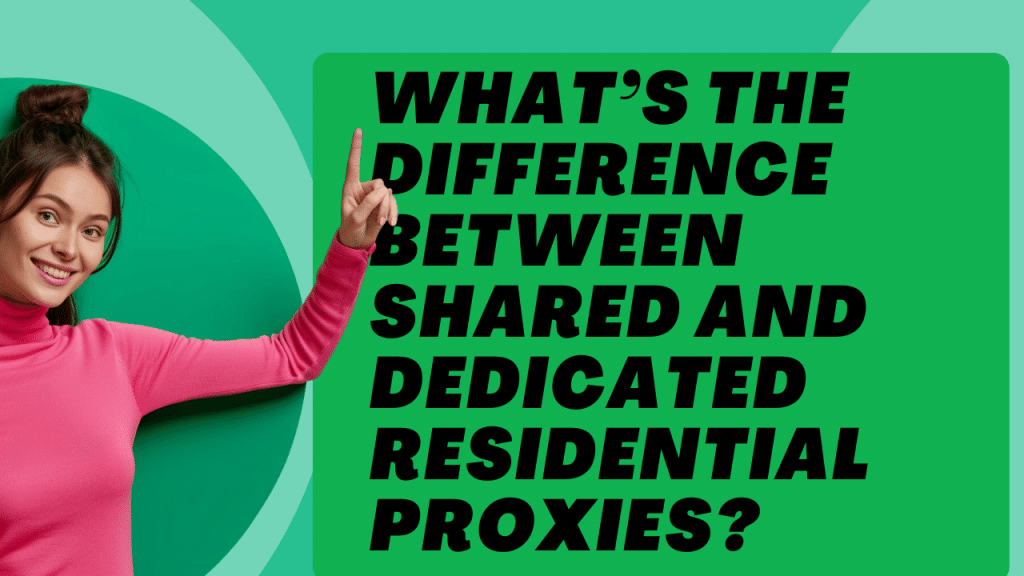When it comes to choosing the right proxy service for your needs, understanding the differences between shared residential proxies and dedicated residential proxies is crucial. Whether you’re a marketer, a data scraper, or just someone who values online privacy, knowing which type of proxy suits your purpose can save you both time and money. In this article, we’ll break down the key differences, advantages, and disadvantages of each proxy type, helping you make an informed decision.
Shared Residential Proxies: What Are They?
Shared residential proxies are proxies that multiple users can access simultaneously. These proxies use IP addresses that come from real residential locations, making them appear as though they belong to an ordinary household. But since they’re shared, several users are leveraging the same IP address at the same time.
Key Features of Shared Residential Proxies
- Cost-Effective: One of the most significant advantages of shared residential proxies is their cost-effectiveness. Because the cost is split among multiple users, shared proxies are generally cheaper than dedicated ones.
- High Anonymity: Since multiple users are sharing the same IP address, it becomes harder for anyone to trace back activities to a single individual. This can be beneficial if your primary concern is staying anonymous online.
- Potential Performance Issues: The flip side of sharing an IP is that performance can sometimes suffer. If one user is consuming a lot of bandwidth or engaging in activities that slow down the proxy, everyone else sharing that IP will feel the impact.
- Risk of Blacklisting: Another downside is the increased risk of blacklisting. If one of the users on the shared proxy engages in suspicious or malicious activities, the entire IP could be flagged or blacklisted by websites and services, affecting all users.
When to Use Shared Residential Proxies
Shared residential proxies are ideal for tasks where budget is a concern, and performance isn’t critical. They are well-suited for:
- Low-volume web scraping
- General web browsing
- Accessing geo-restricted content
However, if you require consistent performance and reliability, a shared proxy might not be the best choice.
Dedicated Residential Proxies: What Sets Them Apart?
Dedicated residential proxies are exclusive to a single user. This means that the IP address you are using is not shared with anyone else. Because of this exclusivity, dedicated proxies come with a different set of advantages and are often considered more reliable.
Key Features of Dedicated Residential Proxies
- Exclusive Access: With dedicated proxies, you have complete control over the IP address. No one else can use it, which means you won’t be affected by other users’ activities.
- Reliable Performance: Because you’re the only one using the proxy, you can expect a more stable and faster connection. This makes dedicated proxies perfect for tasks that require high performance and reliability.
- Lower Risk of Blacklisting: Since you’re the sole user, the risk of the IP being blacklisted is significantly reduced. Your actions alone determine the reputation of the proxy, which is crucial for long-term projects.
- Higher Cost: The main downside of dedicated proxies is their cost. Because you’re not sharing the expense with other users, dedicated residential proxies are usually more expensive.
When to Use Dedicated Residential Proxies
Dedicated residential proxies are best for high-stakes activities where performance and reliability are non-negotiable. They are perfect for:
- High-volume web scraping
- Managing multiple social media accounts
- Ad verification
- Accessing sensitive or restricted data
If your project requires long-term use of a stable and secure proxy, the investment in a dedicated residential proxy is often worth it.
Comparison of Shared vs. Dedicated Residential Proxies
To help you better understand the differences, here’s a quick comparison table:
| Feature | Shared Residential Proxies | Dedicated Residential Proxies |
|---|---|---|
| Cost | Lower (Cost shared among users) | Higher (Exclusive access) |
| Performance | Variable (Depends on other users) | High (Stable and reliable) |
| Anonymity | High (Multiple users share the IP) | Moderate (Single user) |
| Risk of Blacklisting | Higher (Due to shared usage) | Lower (Single user controls activity) |
| Best For | Budget-conscious, less intensive tasks | High-performance, critical tasks |
Choosing the Right Proxy: Key Considerations
When deciding between shared and dedicated residential proxies, consider the following factors:
1. Budget
If cost is your primary concern, shared proxies are likely the better option. However, if you can afford to invest in better performance and reliability, dedicated proxies offer a more robust solution.
2. Performance Needs
For tasks that require consistent performance, such as high-volume web scraping or managing multiple accounts, dedicated proxies are the way to go. Shared proxies may be sufficient for less demanding activities, but they can’t guarantee the same level of reliability.
3. Risk Tolerance
Consider your tolerance for risk, particularly when it comes to blacklisting. If your work involves accessing sensitive data or you can’t afford interruptions, the lower risk associated with dedicated proxies is a major advantage.
4. Anonymity Requirements
If anonymity is your top priority, shared proxies might offer a slight edge because of the added layer of obfuscation provided by multiple users. However, this comes with trade-offs in terms of performance and reliability.
Conclusion
Both shared and dedicated residential proxies have their place in the digital ecosystem, and the right choice depends on your specific needs. Shared proxies offer a budget-friendly option with decent anonymity, but they come with risks related to performance and blacklisting. On the other hand, dedicated proxies provide superior performance and reliability at a higher cost, making them ideal for critical tasks.
By understanding these key differences, you can make a more informed decision and choose the proxy service that aligns best with your objectives.
Whether you need a proxy for web scraping, managing social media accounts, or just ensuring your online privacy, considering the benefits and drawbacks of shared versus dedicated residential proxies will guide you to the right choice.

